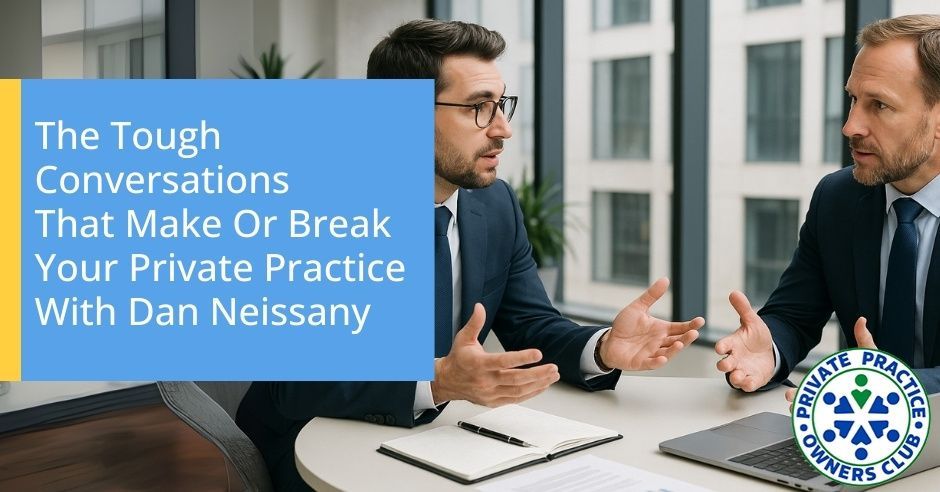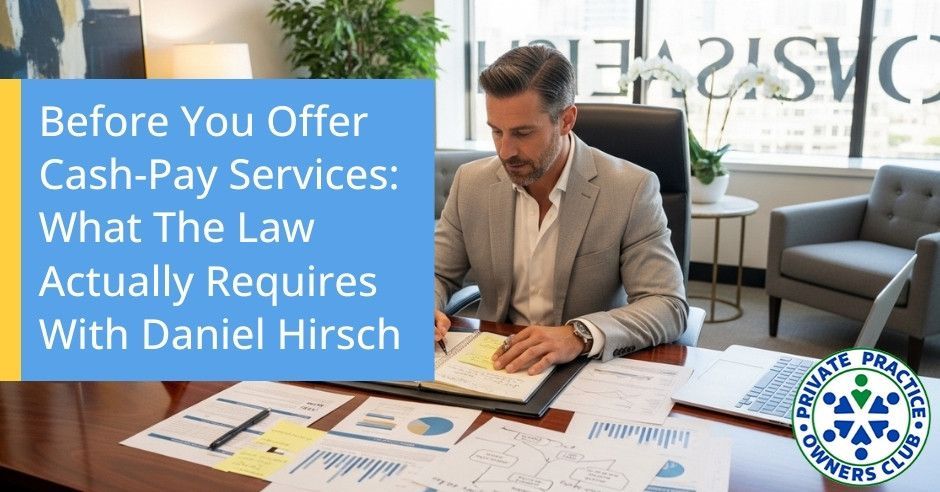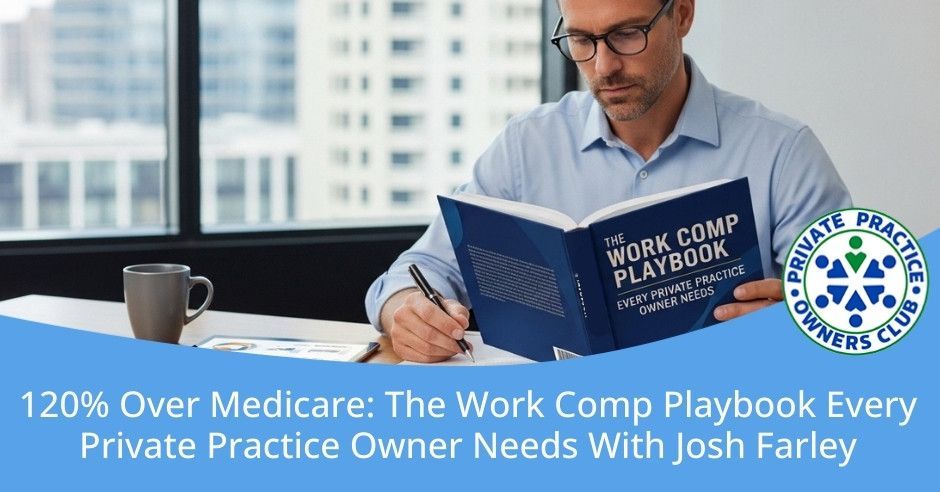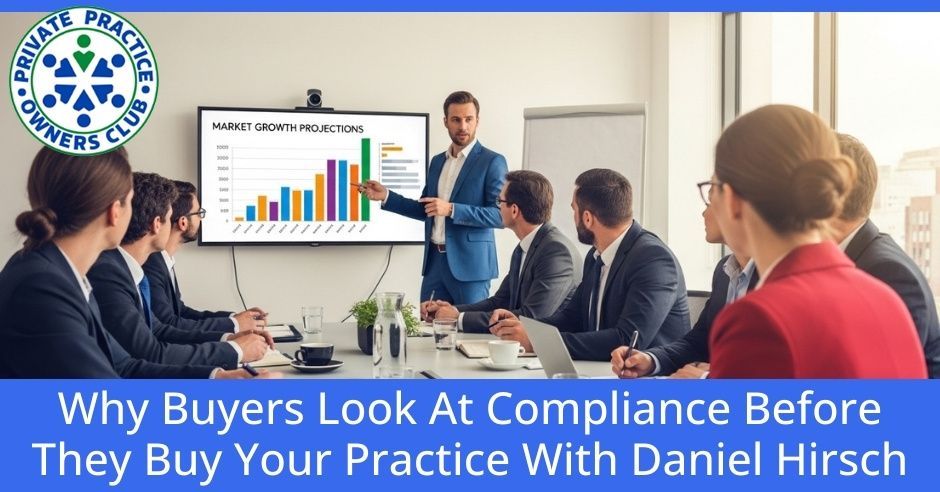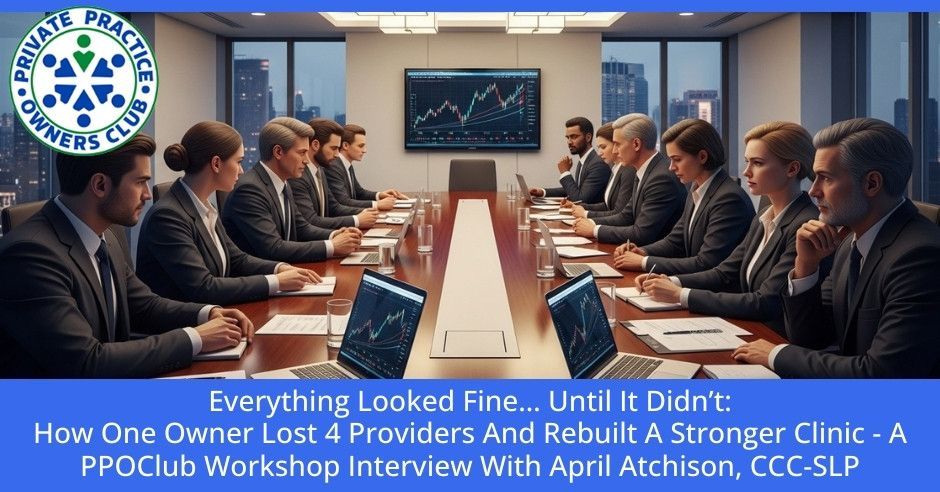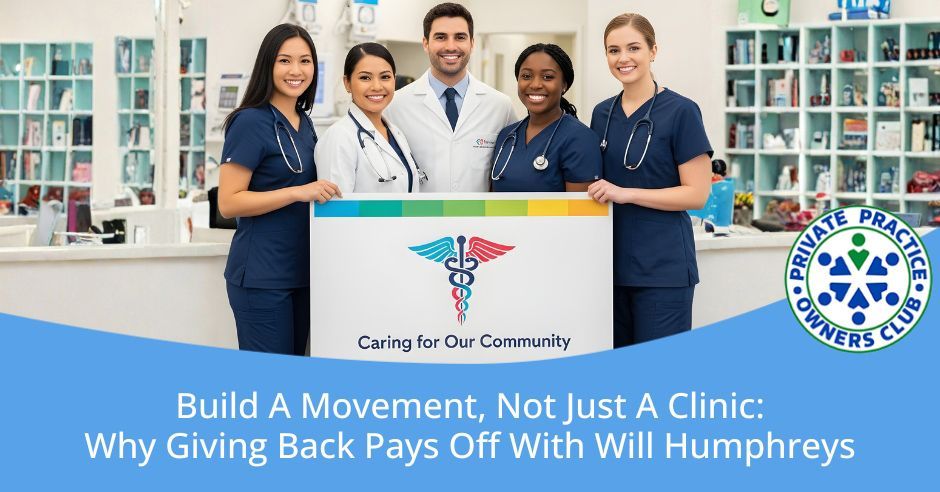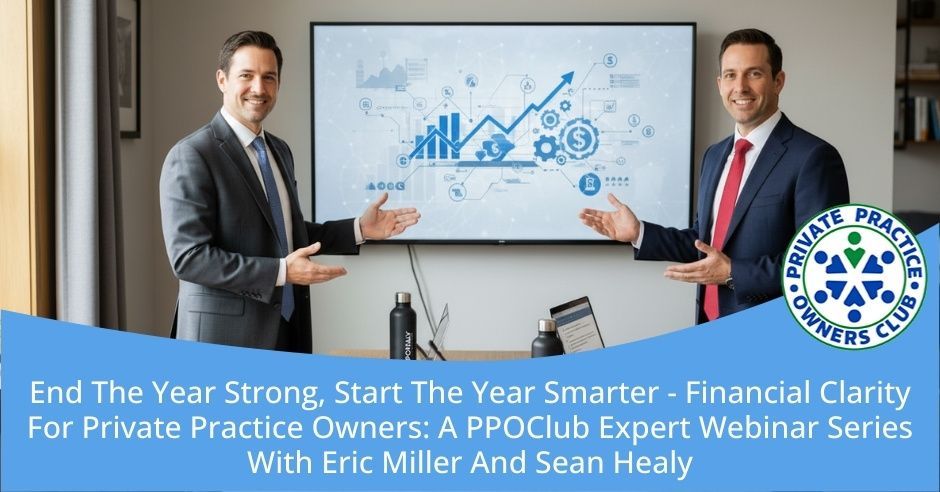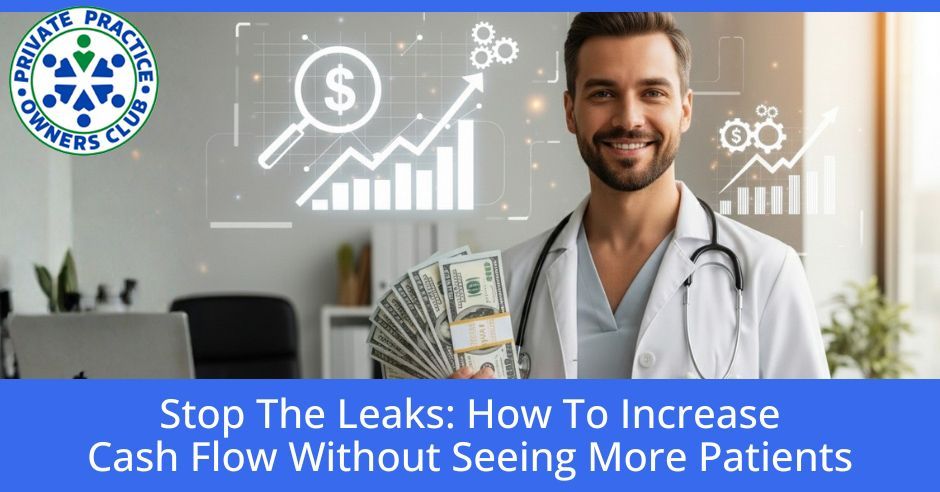Most practice owners think profitability and patient care are at odds—you either make money or you do right by your patients. The truth? You can (and must) do both.
In this episode of the Private Practice Owners Podcast, Adam Robin sits down with Dan Neissany—physical therapist turned entrepreneur, healthcare consultant, podcast host, and co-founder of Best Practice Strategies. Dan’s mission is simple: help practices grow without burning out.
They dig into:
● Why money isn’t evil—and how profitability actually fuels better patient care
● The tough conversations practice owners avoid (and why avoidance kills progress)
● How data-driven decisions reveal hidden profit leaks and growth opportunities
● The mindset difference between thriving owners and struggling ones
● Why systems, accountability, and leadership—not just hard work—are the real drivers of success
If you’ve ever felt torn between helping patients and making a profit, this episode will reframe what it means to run a business that serves everyone—patients, employees, and you.
🎙️ Learn how to balance care and cash flow without compromise.
👉 Connect with Dan at tbpstrategies.com or find him on social media @DanNeissany. Links in the show notes.
---
Listen to the Podcast here
The Tough Conversations That Make Or Break Your Private Practice With Dan Neissany
Entrepreneurial Roots: How Dan Learned Business In Healthcare
We have a new guest, a first-timer. We have Daniel Neissany. Daniel. It’s my first time meeting this guy. I can already tell he is a sharp cat. A little bit about him is that he is a physical therapist turned entrepreneur. He is a healthcare consultant, podcast host, and the Cofounder of Best Practice Strategies. I’m going to use my words, but they help practices grow their business without the burnout. Does that sound right?
Yeah.
It’s great to have you.
I appreciate you having me on.
I would love it if you could maybe do the introduction. Tell us about yourself. Tell us about who you are and what you do.
I graduated in 2007. I practiced for, give or take, about fourteen years. I started like everybody else, entry-level. I was treating patients and was loving it. I grew into a director role and started understanding the business at a high level, and more so about how to collaborate business between good patient care. One of the misconceptions I find in healthcare, in general, is that you either can make money, but you treat patients like crap, or you treat patients amazingly, and then you make no money out of it. Seeing that we can blend them both was insightful for me. We grew and developed.
In about 2001, I started hitting a major plateau with where I was at. I loved the company, but I advanced as far as I could go. If I left there and stayed in New Jersey, it didn’t feel right. My wife and I also got a little bit plateaued with being in New Jersey, which is where we’re originally from, so we ended up moving out to Las Vegas in 2002.
I took a little bit of time to figure out what the heck I wanted to do. I was at the point where I wanted to take what I did with that company in New Jersey, which we can touch on, and bring that to other healthcare practices. I saw what works. It’s a great model that’s not utilized too much. I started a podcast back in November 2024. I focused on a lot of great high-level business concepts that we teach. I’ve done some business investments. It’s been quite a great last few years.
That’s cool. You were an intrapreneur with your involvement in the private practice. During that time, how did you learn so much about business? Was there some structured mentorship that you got in that company, or is that something that you took on on your own? How did you develop your passion and knowledge around business?
At the end of the day, I feel that it takes two things. Number one, you have to want to learn the knowledge. You need to be curious enough to seek it out. Unfortunately, in healthcare, there are a lot of owners who want to hide information because they’re almost afraid. You see this in business, in general. They’re like, “If I teach you everything, then what’s to stop you from opening your own clinic and using my secrets to do your own thing?” It’s so silly.
Add your custom HTML here
You have to want to learn the knowledge. You need to be curious enough to actually seek it out.
Fortunately, the CEO of the company I worked for was an open book. He specifically said to me, “Whatever you want to know about the business and the company, you ask and I’ll tell.” I was very fortunate. What I got as a strong benefit from him is that his background was not in healthcare. His background was in finance. He worked on Wall Street, so he saw things a little bit differently.
I know somebody might read that and say that he was all about the numbers. He understood the numbers a little bit better than a lot of us in healthcare tend to see them. He was able to see patterns and understand the importance of data. That’s what helped me out. As I got better, he kept supplementing me with some knowledge. Like anybody who wants to grow and develop, you do stuff on your own, and you have to actively learn. Being able to read books outside of healthcare and content related to finances, economics, and stuff like that made a huge difference in combining the medical background with the financial background.
I love that. That’s cool. One of the biggest challenges, and I would assume in most industries, but maybe more specifically healthcare, is that we have a tendency to do a few things. Number one, we look at the numbers side of things and label that as evil. If you’re interested in anything besides giving all of your energy, time, and care to your patient, then you’re labeled as an evil person or a bad person.
It’s like, “You’re making money? How dare you?”
The Balance Act: Profitability And Patient Care In Practice
I’ve worked with a lot of practice owners, and I’ve never seen any practice owner be successful with that frame. I don’t know about you, but I’ve never seen that. I’ve always seen that the practice owners who do well are able to have that balance between, “We’re still going to serve our patients better than anybody else, but we’re also going to get paid more than anybody else, too.” They’re both equally important. Understanding the numbers and the metrics and demanding profitability inside the business is as important as providing that world-class experience as well.
If you think about it, a lot of the good people in medicine tend to be very altruistic, which makes you want to almost give stuff away. Maybe giving that stuff away is your time, your energy, or whatever it may be. There’s that aspect, to your point, where it’s like, "You're doing something financially well. Does that mean you’re doing something unscrupulous? Are you doing unethical work? Are you billing fraudulently?”
It’s hard for a lot of people to wrap their heads around being able to provide great customer service while understanding what makes a business run. That’s one of the things that I find in not just PT, but chiro and healthcare across the board. Healthcare is still a business. If you don’t make positive revenue, A) How are you staying open? B) How are you giving raises and bonuses to employees and re-investing into the practice to maybe buy new equipment? If you’re growing, fortunately, and you want to maybe open up a new facility, it’s hard to do that if you’re not making any money.
Overall, that goes into this mindset that we have in the US, where a lot of people have grown up thinking money is evil because they don’t have those conversations when they’re younger. You see stuff all over social media that if you’re wealthy, you’re probably doing some crappy stuff. The people who know how to run a reputable business also understand that part of that is developing a great brand, and developing that great brand means treating people well. That means externally, which are the patients, and then internally, which are your employees.
Creating that great customer experience also includes creating an even exchange with your customers. It’s give and take. It’s layering in that accountability with your patients and saying, “You’re going to have to have some skin in the game. You’re going to have to pay your bills. You’re going to have to show up to appointments on time. You’re going to have to be accountable to your plan of care.”
The layering, accountability, and challenge are part of providing, because at the end of the day, what we’re trying to do is we’re trying to empower our patients to be independent around their health. If we play the savior and do it all for them, then we never even accomplish that. We put ourselves as the solution instead of empowering our patients to be the solution.
I’ve talked a lot about patient retention. Some people push back and say, “Don’t you want them to get better?” I’m like, “You’re not understanding what I’m saying here.” Patient retention doesn’t mean just coming into the office. It’s like you said. It also means that they’re doing the necessary things globally that are going to help them get better. If they’re not even willing to commit to whatever recommendation you made for their frequency or what have you, then they’re not doing what they need to do at home. It’s plain and simple.
I’m very interested in the stats that help us understand those kinds of concepts. When we’re research-oriented, a lot of us know, or at least we should know, that the number of patients who don’t do anything at home, don’t do their home exercise program, or how many exercises they will do and for how long, the psychology of people is that they will get complacent. To your point, how do we get them to take care of themselves and understand that you get better, but the name of the game is how you stay well?
It’s no different than running a business. You start something and it’s like, “How do I continue this long-term? I’m not looking for a stopgap solution.” It’s creating accountability. Even that goes into being able to have conversations with patients that sometimes a lot of providers find a little difficult or challenging. If you care about people, there are a lot of difficult conversational avoidance, in general, with people. It’s like, “I don’t want to hurt their feelings.”
In reality, the people who care the most are the ones who have the conversations that tend to be avoided. It’s talking to that patient who has knee pain when they’re 350 pounds and they’re 5’4” to understand what the real culprit is and not be afraid of, “What if they don’t like me?” That’s what it comes down to. It’s also understanding how we need to even set our employees up to have those kinds of conversations as opposed to assuming that they all will.
The people who care the most have the conversations that tend to be avoided.
The Gift Of Truth: Why Difficult Conversations Drive Patient Outcomes
What a great gift for you to be in a position where you can learn from a guy with that mentality and that mindset. I never had that. I had to pay for that.
That’s the thing. At the end of the day, a lot of us, in general, always say that we care about people the most, or, “I want to bring a lot of value.” I don’t think we fully understand what that means. When we look at bringing value or being the provider who is committed to an outcome, are you going to talk to a patient about what needs to be said in order to get them the outcome?
It’s easy to do stuff when it’s low back pain. I’m 5’4” and 110 pounds, so you’re not having a conversation centered around weight. It’s probably your body posture stinks or body mechanics. Those are easy conversations to have. Are we willing to have the conversations that are necessary? The ones that are easy, anybody can do that, but what about the ones that are hard? What about the ones that maybe the patient says, “Screw you. I’m not going to come back in because you made me feel like crap.”
There is a way to deliver feedback in a good way versus a bad way. If you do these things with kindness and are coming from a place where you’re focused on, “What do I need to do to get you the outcome?” You’ll have the conversation. For me, I didn’t have to pay, but it’s not even a matter of getting coaching and whatnot. It’s understanding the mindset of what it means to care as much as I say I do.
I was almost thinking about moving on to a different topic, but you fired me up when you said that. That’s such a good point. We’re talking about patients, or the tough decision to demand that they pay their copay. Whatever that hard friction is in the business, when you avoid that, you’re doing it for yourself. We call it care, but in reality, we’re avoiding the uncomfortable emotion that we have to experience. If you truly care, you’re willing to absorb that inconvenience and be the leader in this situation. That was a good point that you made.
It is true. Ultimately, in those scenarios, if you don’t tell the patient the truth, what ends up happening is the same outcome all the time, which is they don’t get better. If you’re going to be focused on growing and improving yourself as a professional, then you have to say, “What do I need to do to do that?” Even to your point about something like copays, I’ve seen that a ton.
Maybe the patient has a $20 copay and is like, “I don’t want to pay.” Whoever is in charge is desperate, or desperate-sounding at least, to get the person in and is like, “I’ll waive it.” You don’t understand psychologically what you’ve said to the patient. You’re telling them that you’re desperate. It’s not a matter of power, but you have to have some authority.
It’s not a matter of that doctor who says, “You got to do this,” but you have to at least demonstrate, “I know what I’m talking about. I’m a professional here.” When you transfer that power over to a patient, they right away know, “I can pretty much do whatever I want. You’re not going to say anything. If you tell me to maybe come in twice, I’ll come in once. I know you won’t say a thing.”
You’re not being the leader in that situation. You’re being led. The way I’ve heard it said is, “If it’s not important to you, it won’t be important to them.” I did a live training. One of the first things is that if you want to generate referrals or if you want to generate a culture of performance, you and your team must be seen as the authority. They must be perceived as the authority. They have to. You have to.
People don’t want to be your buddy. The reason they’re there is that they’ve lost control of that domain of their life. They’re seeking out an expert to lead them and guide them through the challenges because they don’t know what to do. If they knew what to do, they wouldn’t be there. They need you. You’re super smart and talented, so be a doctor.
Mastering Your Finances: Unlocking Profitability In Private Practice
Let’s move on. That’s a great topic, but there are other things that we want to talk about. I want to talk about finance, since that’s your background. Talk to me about finance. Profitability is tough in private practices. Some of the things that I see from my perspective around profitability are not having strong systems around the financial touchpoints in the practice, like over-the-counter collections, billing, denial rates, and inefficient coding. I also see a lot of limitations with health insurance, such as low reimbursement rates. Also, the Medicare rule impacts your ability where you can’t see two patients at one time and all that stuff. In general, how can we help practices get more profitable?
One of the biggest aspects of business is understanding trends or patterns. If we look at something like insurance reimbursements, by all means, if there’s somebody out there who says, “Where I live, they go up every year,” please tell me. I might move there and open a clinic. We know that year after year, the reimbursements go down. Year after year, the amount of denials goes up. Costs are going up. These are things that we know, but it’s either information that some of us ignore, or we’re not paying attention to it. You mentioned some good data there.
At the end of the day, you could be like, “I don’t know how to create KPIs.” Understand you’re spending more and making less. That’s the major trend. To your point, it’s like, “What do I do?” Most people are going to say, “The only thing that I know to do is treat patients, so let me get more of them.” Do we have the bandwidth to treat them? Half of my staff is already telling me they’re exhausted. Maybe 20% of them are feeling burned out. What happens if I add more patients to their plate? Do I lose them? It’s a cycle.
At the end of the day, to your point, you have to understand the data. There's so much stuff you can do. It doesn’t mean you sit behind a desk, figuring out the day, scrutinizing spreadsheets while your team’s out there struggling to treat patients. It is understanding, to your point, “Are we getting paid? What are we getting paid? Who’s paying us? Is my team collecting copays at the front? What does our billing look like? Are we getting all the necessary information at the front?”
I’m a big believer that we tend to want to focus on all the stuff that is not in our control. It’s very easy for me to complain about insurance, like UnitedHealthcare. They’re not changing. Insurance is the second biggest lobby in the United States. Nine figures. Pharmaceuticals are number three. The deck is stacked against us, but that’s what we want to focus on. It’s easy to complain. A lot of us don’t focus on, “What are the components in my business that I have full control over that I can improve?”
You mentioned leadership. There are systems. How long does it take to get a patient on the phone? How long do I make them wait? What’s all that stuff? In our culture, how long do employees stay? What’s their work level? Are they motivated? Do I have a plan to grow? I remember there was a practice owner. I asked him that question. I was like, “What do you want to do for growth?” He was like, “If we keep doing what we’re doing, I’m good.”
I’ve probably said this 100 times. If you’re not making at least what inflation is, you’re losing money. If inflation, under normal circumstances, is 3% or 2.9%, that means if you want to make money, you have to increase your revenue by over 3%. It’s simple stuff like that that a lot of people don’t comprehend. Even if they do, they don’t understand. They’re like, “How do I do that when I’m in a field, unfortunately, where the reimbursements are going down and denial is going up?” That’s where it’s being able to look at, “I know the easy answer. I can just get more patients,” but it’s really looking at, “What services can I possibly add?”
In the PT world, a lot of people open their own clinic and stick to PT. It’s hard to do that, for sure. You can make improvements and get better, but at some point, you’re going to be looking at, “Do I add something to the mix? Is it a new provider?” Maybe it’s a new discipline, like OT or something along those lines, that can help treat the patients. You’re still providing good support, but it’s helping you get revenue. It can create some good relationships with doctors. It’s like, “Is there some DDME that maybe would help my patient base that’s within reason to prescribe to them?” That’s how I would look at it.
Ultimately, nobody is coming to help you out. I know there is a saying that nobody is coming to save you. You've got to take control. Even if you do not own your own practice and you start out like me, where you’re a practice manager or a director, and your goal is to still help run a business, there is this aspect that you’re affecting other people’s livelihoods, not just the employees. You’re affecting their family, too. If you’re not growing and figuring out, “How do I sustain this over the next two years?” or, “What’s my plan for the next five years? Do I want to sell it or get bought out?” These questions have to be asked. A lot of times, we end up being very reactive instead of being proactive.
A few things that I took away from that are, number one, it starts with data. I had a new client who said, “I'm a little fuzzy around profitability. I’m struggling this month. I’m not sure what’s going on. Can we jump on a call? Can you help me?” I said, “Sure. Is your dashboard up to date?” He says, “No.” I was like, “Call me when your dashboard is up to date.”
I said, “I can’t help you until your numbers are ready.” I’m not a magician. I’m not a wizard. I must have data. It’s like if I went up to you and I was like, ‘Here’s a blindfold. I want you to get me to Disney World.’ It’s impossible. I can’t help you.” All of your profitability, in my opinion, is in your data. Your profitability will change when you stop trying to tell the story, let the data tell the story, and start making data-driven decisions around how you should deliver care in a financially profitable way.
Some people would view that as sounding very business-like and not maybe as focused on the patients, but it could even be simple stuff. If you’re spending $4,000 a month on marketing, are you paying attention to how many patients you’re getting in as a result of that? You’re like, “I’m not doing any of that.” It’s even normal stuff that is important. If you’re wasting it, that’s less that you can reinvest into your employees in the company.
I always love it when you ask business owners, “How many of you love numbers?” and half of them have their heads down. It’s like, “Your business is all about knowing numbers, and you’re saying you hate them and you don’t keep track of them.” It's very difficult and nearly impossible to run a great business without understanding data. It doesn’t have to be reams of Excel spreadsheets, but it’s at least some understanding of what’s coming in versus what’s going out.
When you’re looking at the data, it’s important to know that it’s not all about pushing numbers. It’s about understanding what your options are. You can’t make a decision if you don’t know what your options are. Sometimes, it might be about increasing productivity. I’m not saying that’s never the case, but sometimes, it might be about dropping a low-paying insurance or going out of network with somebody.
That’s what I was thinking. It’s like, “This insurance is now paying us $20 a visit.”
We don’t know that unless we have the data.
I’m like, “When did that happen?” They’re like, “Four months ago, but we found out now.” I’m like, “How much now did we end up maybe giving away by not understanding what’s coming in?”
It might be that your denial rate is at 10%. You have a billing issue, so we have to fix the billing. It might be that you’re not collecting over the counter. It might be that the new grad you hired doesn’t know how to bill it. There are so many things that it could be, but I’m not going to sit around and try to guess. I need to know what the data says.
The data will tell you, “There’s the issue. Here are the options.” It takes the emotion out of it. Here’s the cool thing. There’s usually always a solution. When you do see the options, it’s about like, “Which one of these options aligns with the values and the culture that we want to have?” That’s a much more productive conversation than, “I don’t have any money to pay my payroll. What do I do?” You’re being more proactive about it.
It’s like, “Could we have maybe worked on this a few months ago instead of where we’re at now?” That goes back to my point about being proactive. You don’t pay attention to these things until you start noticing, “We’re barely skimming by.” It’s like anything else. You don’t start a business to struggle. You’re going to struggle at the beginning. It’s not that you open the doors, and then you’re flooded.
When you ask every business owner, “Why did you start this?” They are going to give you a lot of the same thing. They’ll say, “I thought I could treat patients better. I wanted a little bit of freedom and some flexibility.” It turns around, and they’re saying, “I’m barely getting by. I’m more stressed now than I was when I was a W-2 employee.”
The Entrepreneurial Mindset: Navigating The Highs And Lows
It’s also important to recognize that entrepreneurship isn’t easy. It’s a pretty rough lifestyle. Not everyone should be an entrepreneur. Not everyone should be a business owner. It’s going to come with some sacrifices. There are going to be some ups, and there are going to be some downs. I don’t think it’s about eliminating those. It’s mostly about developing systems and structure in your life so that you can handle them effectively without crippling yourself, like having the team in place, having the systems in place, and using the data to help you drive decisions. If you build an organization that is equipped to solve hard problems, then it won’t land on you all the time, which goes back to building that organizational structure.
Even before that, though, there is a definitive mindset that you need to have to step into the world of being an entrepreneur or being an owner. You get to the point where you say, “I’m going to build out a team and build out systems.” As Mike Tyson always said, “Everybody’s got a plan until they get punched in the face.” Are you going to be able to encounter those setbacks and those little failures and not let them crush you? At the end of the day, entrepreneurs have some of the highest alcoholism and depression rates. Sleep issues are horrible. Their relationships tend to be crap.
When we’re talking about building a business, you’re also probably doing it for family, too. You’re not looking to say, “I ruined my relationship with my wife, and I have a crappy relationship with my kids.” It is, “I hope I have more time to spend with them.” These individuals who don’t understand that and then combine it with not having any systems in place, then how do they deal with the stress?
They didn’t develop the mental fortitude to prepare themselves. They’re like, “I've got to deal with it by either pouring in more hours.” A lot of us tend to think harder and longer that work gives us a better outcome. They’re like, “How do I deal with it? I have to resort to drugs or alcohol.” Unfortunately, for some people, it is suicide. It’s stuff that we don’t typically talk about. To your point, you go on social media, and everybody is saying, “Be your own boss.” Please don’t do that before you understand the challenges that go with that.
Traits Of Top Performers: What Makes Entrepreneurs Truly Successful?
Let’s stay here for a second. When you’re working with entrepreneurs, you’re getting on these phone calls with them. You’re meeting with them. What are the characteristics that you see in those who are way more successful versus those who struggle? Are there certain characteristics?
Yeah. Not the most successful, but a lot of entrepreneurs have a big drive in them. You have to have a little craziness in you. It’s way easier to be an employee. You don’t care what anybody says. Even back in the day, when my family would be like, “Why don’t you open your own clinic?” I’d be like, “Why would I do that? It’s much harder.” Also, I wasn’t there.
At the end of the day, a lot of those individuals who do well are high drivers. They’re the ones who are like, “I take action. I’ll figure it out as I go along.” A lot of other people who don’t become entrepreneurs are the ones who overthink or over-deliberate, which is an issue in medicine. Typically, a lot of us are very analytical. The individuals who are like, “I’m going to forge ahead. I’ll make the mistakes and learn along the way,” typically, at some point, need to be complemented with somebody who does some analyzing.
The best entrepreneurs fill themselves with people who fill in the gaps. The people who tend to do the worst, but they won’t get to the point where they open a lot of their businesses, are the ones who want to overanalyze. Maybe it’s all about building social connections, but then they struggle because they have a lack of systems.
The best entrepreneurs surround themselves with people who fill in their gaps.
That’s where it’s at. Everybody has some real strengths to help them out, but the best ones are the ones that take a lot of action. Those guys and ladies are also some of the most challenging to work with because they’re very headstrong. It’s being able to not make them feel stupid or that they’re doing anything wrong. It’s to show them, like, “Here’s how we can complement what you’re already doing, which is great. You've got to this point where you’ve been successful.”
We end up leaning on that success and think in our heads that that’s going to create a feature success. We think, “My way has worked, so why change it?” Going back to the numbers, what are the numbers showing? How are you growing year after year? Those individuals are awesome to work with because they tend to be very action-oriented. It’s a little challenging dealing with the ego, but we all have it. It’s giving them some grace and helping them see how you’re there to make their business that much better.
I love how you recognize that. I see this in employees and team members that I bring on when I interview clinicians. I’m always looking for that high-drive individual to bring onto my team. They’re somebody who wants to be an entrepreneur, but doesn’t necessarily want to take the financial risk. They want to have a safety net.
The two things that I look at are, number one, do they have a vision? Do they have a big, scary thing in their head that they want at least a little bit? Have they figured out what they wanted? Are they brave enough to say it out loud? Do they have the courage to say it out loud?” A little bit of ego is good where it’s like, “I want to open five clinics.” I want to hear that versus, “I want to figure out how to hire an employee.” It’s fine, but the ones that have that big drive and the ones that have that big vision, even if they don’t land at 5 clients, they might stay at 1. They’ve got the drive that drives them day over day.
That’s a great point. The biggest thing with that is also understanding why that is their motivating factor. When somebody says to you, “I want to scale up to $10 million a year,” it’s like, “What’s going on in your head to give you that?” Is it all about feeling significant, like, “I’m doing this to make myself feel big,” versus, “I want to make this much or open this many clinics because I want to be able to serve 2,000 or 5,000 patients a year.” That makes sense.
It’s like, “I want to be able to make $10 million so I can donate a crap load of it.” That’s good because then, you’re going to have the right mindset where you’re more focused on the actual business, including the employees, versus that person who says, “I want to grow 5 clinics so I can say I grew 5 clinics.” They’re going to be all about themselves.
Connecting With Dan: Resources For Aspiring Practice Owners
I appreciate the conversation. I’m pretty confident that at least one person is going to get some value. If people want to reach out to you, connect with you, and learn about you and your world, how do they find you?
My website is
TBPStrategies.com. In every social media platform, it’s my name, Dan Neissany, not my full name. It is Dan Neisanny on my social platforms. That’s where we’re at. Honestly, we have good content on the website. We’re putting out some courses specific to healthcare, hiring, onboarding, and patient retention. We’ve got some good stuff coming out as well that, hopefully, can serve some people quite well.
I appreciate it.
Likewise. This is awesome.
Important Links
About Daniel Neissany
Add your custom HTML here


